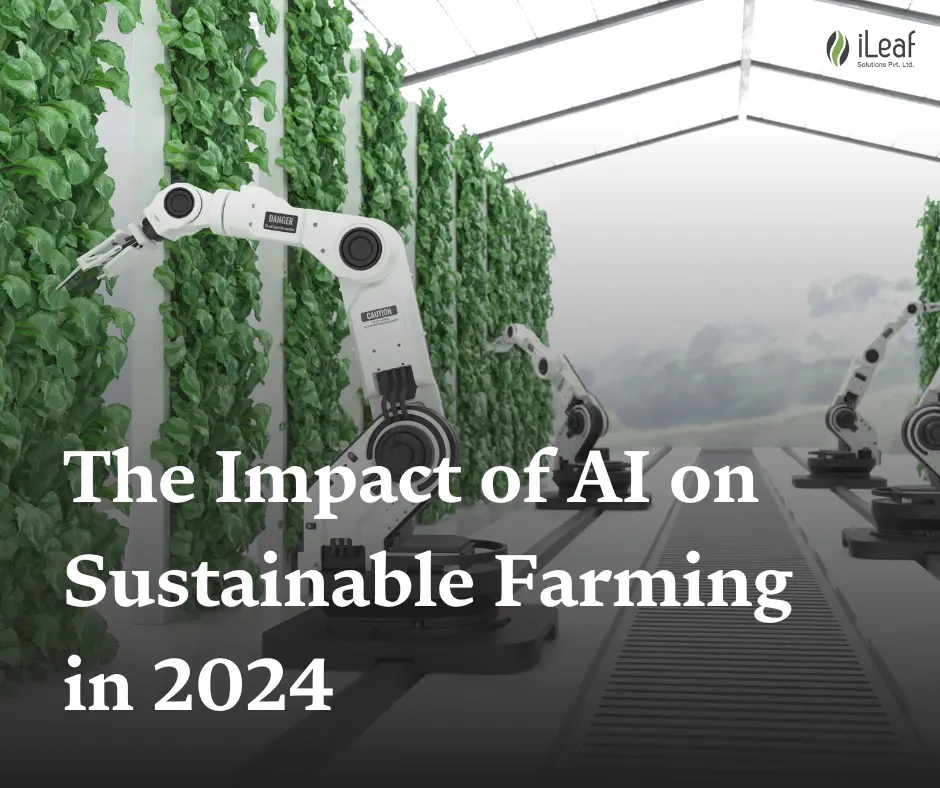AI Revolutionizes Sustainable Farming: Driving Change in 2024 Agriculture

Overview
- Introduction
- Energy Efficiency and Optimization
- Precision Agriculture and Crop Management
- Water Management and Conservation
- Waste Management and Recycling
- Climate Change Adaptation and Mitigation
- Ethical Considerations in AI for Sustainable Farming
- The Future of AI in Sustainable Farming
- Call to Action
- Conclusion
Introduction
The year 2024 continues to witness the rise of artificial intelligence (AI) as a transformative force across industries, including agriculture. As the demand for sustainable practices intensifies, AI is emerging as a powerful tool for optimizing resource use, enhancing productivity, and mitigating the environmental impact of farming activities. This article delves into the various ways AI is shaping sustainable agriculture in 2024, exploring key areas like energy efficiency, precision agriculture, water management, waste reduction, and climate change adaptation.
Energy Efficiency and Optimization
Energy efficiency is crucial for sustainable farming, and AI plays a vital role in achieving it. Smart sensors and data analysis tools powered by AI enable farmers to monitor energy consumption patterns in real-time, identifying areas for optimization. AI can also help in predictive maintenance of equipment, reducing unnecessary energy waste and reliance on non-renewable resources.
Case Study: Granular, a leading AI-powered agri tech company, uses AI-driven algorithms to analyze farm data and recommend energy-saving strategies like optimizing irrigation cycles and adjusting greenhouse temperature control based on weather forecasts. This has resulted in significant reductions in energy consumption for participating farms.
Precision Agriculture and Crop Management
Precision agriculture, enabled by AI, allows farmers to move away from traditional broad-spectrum practices towards targeted interventions based on specific crop needs and soil conditions. AI-powered tools can:
- Analyze soil data to determine nutrient deficiencies and create customized fertilization plans.
- Monitor crop health through drone-based imagery and machine learning algorithms, enabling early detection of diseases and pests.
- Optimize irrigation systems based on real-time weather data and soil moisture levels, minimizing water waste.
Case Study: The Bayer FieldView platform integrates AI-powered tools like digital scouting and prescription maps to help farmers identify and manage potential yield-limiting factors. This technology has been shown to increase crop yields and improve resource use efficiency.
Water Management and Conservation
Water is a precious resource in agriculture, and AI can help farmers optimize its use. AI-powered systems can:
- Monitor weather patterns and soil moisture levels to predict irrigation needs accurately.
- Automate irrigation systems based on real-time data, ensuring crops receive the precise amount of water needed.
- Identify and address leaks in irrigation infrastructure, preventing water waste.
Case Study: The Israeli company Netafim utilizes AI-powered irrigation control systems that monitor soil moisture, weather conditions, and plant health to create personalized irrigation plans for each field. This technology has helped farmers in water-scarce regions significantly reduce water consumption while maintaining optimal crop growth.
Waste Management and Recycling
Agriculture generates a significant amount of organic waste, but AI can help transform this challenge into an opportunity. AI-powered solutions can:
- Automate waste sorting processes at farms and processing facilities, improving efficiency and reducing manual labor.
- Analyze data on waste generation and composition to identify opportunities for composting and biogas production, promoting a circular economy within the agricultural sector.
Case Study: The Swedish company, Enviro, has developed an AI-powered waste sorting system that utilizes machine vision and deep learning to accurately sort different types of agricultural waste materials. This technology helps farms divert waste from landfills and convert it into valuable resources.
Climate Change Adaptation and Mitigation
The impact of climate change is a major concern for agriculture. AI can play a crucial role in helping farmers adapt and mitigate its effects. AI-powered tools can:
- Analyze historical and predictive weather data to inform planting decisions and resource allocation strategies based on anticipated climate patterns.
- Optimize renewable energy generation on farms through data-driven insights on weather forecasts and energy consumption patterns.
- Develop precision carbon farming strategies, enabling farmers to reduce their carbon footprint through optimized fertilizer application and improved soil management practices.
Case Study: The Microsoft FarmBeats program uses AI and cloud computing to empower farmers with data-driven insights on weather patterns, soil health, and resource management. This information helps farmers adapt to changing weather conditions and adopt more sustainable practices, contributing to climate change mitigation efforts.
Ethical Considerations in AI for Sustainable Farming
While AI offers numerous advantages for sustainable agriculture, it is crucial to address the ethical considerations associated with its widespread adoption. These include:
Data privacy: Ensuring the responsible collection, storage, and use of farm data collected by AI systems is critical. Farmers and consumers must have control over their data and be informed about how it is being used.
Algorithmic bias: AI algorithms can perpetuate existing biases if not carefully designed and monitored. It is essential to ensure that AI tools used in agriculture are fair and unbiased in their decision-making processes.
Transparency and explainability: Farmers need to understand how AI-powered recommendations are generated and the rationale behind them. This transparency fosters trust and empowers farmers to make informed decisions for their farms.
Addressing these ethical considerations through responsible development, deployment, and governance frameworks is essential to ensure that AI contributes positively to sustainable agriculture in the long run.
The Future of AI in Sustainable Farming
The future of AI in sustainable farming holds immense potential.
Advanced robotics and automation: Robots capable of performing complex tasks like planting, weeding, and harvesting with greater precision and efficiency can further reduce reliance on manual labor and environmental impact.
Hyper-local weather forecasting: AI-powered weather prediction models with hyper-local accuracy can provide farmers with even more granular insights into weather patterns, enabling them to optimize resource allocation and adapt to changing conditions.
Integration with other emerging technologies: Integrating AI with other technologies like blockchain and Internet of Things (IoT) can create a holistic ecosystem for data-driven decision-making and resource management in agriculture.
Call to Action
Farmers and policymakers have a crucial role to play in embracing the opportunities offered by AI for sustainable farming while actively addressing the associated challenges. Encouraging responsible innovation, fostering public-private partnerships, and establishing robust governance frameworks are essential steps towards harnessing the transformative potential of AI for a more sustainable and resilient future of agriculture.If you have any queries or any ideas to share, our expert consultants at iLeaf can help.
Conclusion
AI is rapidly transforming the landscape of sustainable agriculture, offering a powerful set of tools to optimize resource use, improve productivity, and mitigate the environmental footprint of farming practices. By embracing AI responsibly and addressing the associated ethical considerations, we can pave the way for a more sustainable and food-secure future for generations to come.














